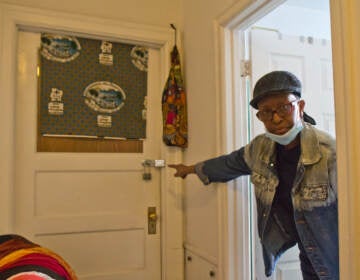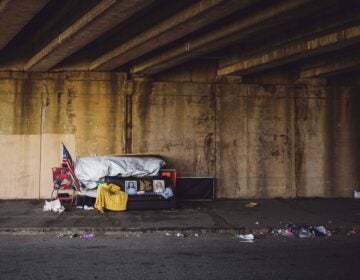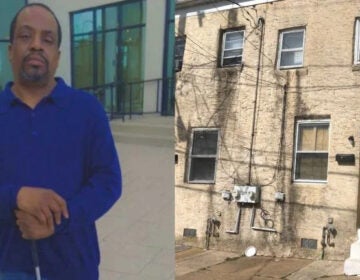Philly just challenged an infamous slumlord to a legal death match and won
After a lengthy court battle with a shadowy slumlord, the city is now the rightful owner of dozens of blighted Germantown housing developments.
Listen 1:26
Garbage is piled in front of an apartment complex in Lower Germantown. (Emma Lee/WHYY)
After a two-year court battle with a negligent landlord, the city of Philadelphia is now the rightful owner of dozens of blighted residential properties that had plagued the Germantown neighborhood for years.
The drama ended last week in bankruptcy court with the Philadelphia Redevelopment Authority repossessing 45 properties tied to a group of companies led by Emanuel Freeman. The neighborhood’s most infamous landlord, Freeman oversaw buildings where heat and water were unreliable, trash piled up in common areas and complaints went unanswered.
City agencies take property owners to court frequently over maintenance and code violations, but it is exceedingly rare for a government to use the legal system to seize a property outright. In this case, the “horrible conditions” of the publicly subsidized affordable housing developments demanded the “extraordinary” action, said Gregory Heller, senior vice president of investment at the Philadelphia Housing Development Corporation.
“Tenants were living in uninhabitable spaces. They needed help from the public sector,” Heller said.
Freeman and his lawyer were not immediately available for comment. The number listed for his management company is disconnected.
The developer, who led the now-defunct social services agency Germantown Settlement for more than two decades, built housing with money from the city. Specifically, $3.55 million in federal loans awarded to the historic group to develop low-income housing. By 2018, Freeman and organizations tied to him owed more than $5 million worth of interest and penalties.
That year, he approached the Philadelphia Redevelopment Authority in hopes of cutting a deal that would allow Freeman to hold onto the properties while paying back the debts with a discount on interest and other penalties. The agency instead chose to put the loans in default and seek possession of the affordable housing properties through the courts, an “extreme” step never before taken by the PRA, Heller said. He credits neighborhood activists who pushed the agency to take action.
“Active members of the community came out to board meetings and showed us the poor conditions of those buildings. We realized the appropriate track was not to work with the developer but get the properties back into the public inventory and move it into responsible hands,” Heller said.
For neighbors, the city takeover offers hope. They’ve lived with the fallout from Freeman’s neglect for years. Most of these properties are abandoned, costing the neighborhood needed affordable housing.
Germantown activist Yvonne Haskins is happy Freeman is finally out of the picture. The longtime neighborhood activist said she hopes the newly acquired portfolio can provide first-time buyers an opportunity to own, and offer other residents the chance to rent an affordable apartment.
“The important thing is removing blight and providing housing,” said Haskins, who is interested in bidding on some of the properties if the city goes in that direction.
“We also need to begin to build wealth among the population of Germantown,” she said.
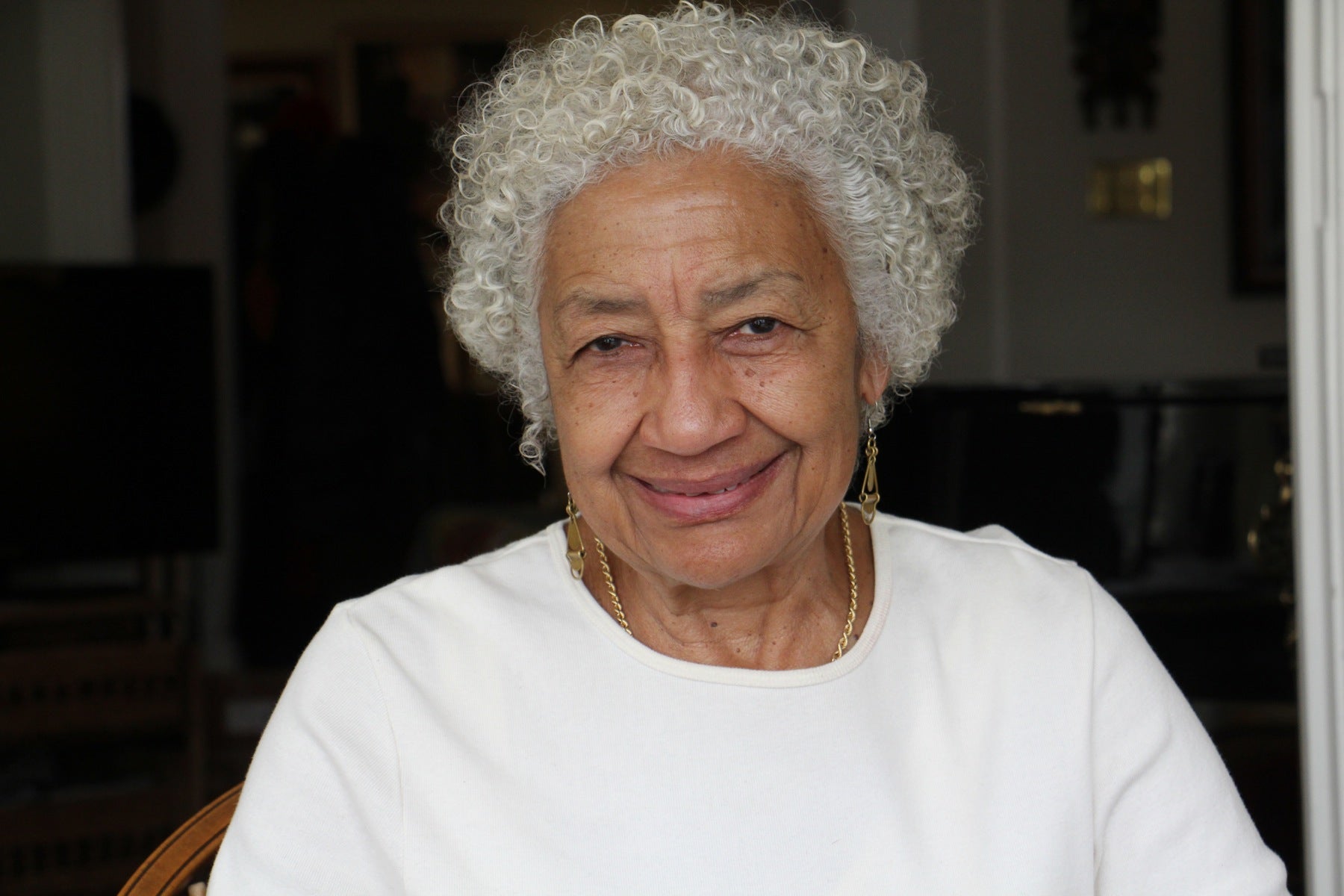
The 45 properties, now under the management of the Philadelphia Housing Authority, represent 140 units of housing. Sites include Hamill Mill apartments on Lena Street in Germantown and a townhouse-style development on East Collom Street, near Germantown Avenue, the neighborhood’s main commercial corridor.

Today, people are living in only 18 of the 140 units,but tenants know who to call if there is an issue, said Dinesh Indala, PHA’s executive vice president for housing operations.
“We told the tenants, ‘Moving forward, PHA is your landlord if you have any problems,’” Indala said.
The plan now is to survey the dilapidated buildings and do a full analysis of the renovation and repair needs. Eventually, the sites could be renovated and reopened by PHA or sold to a qualified affordable housing developer. The sites may require complete gut renovation.
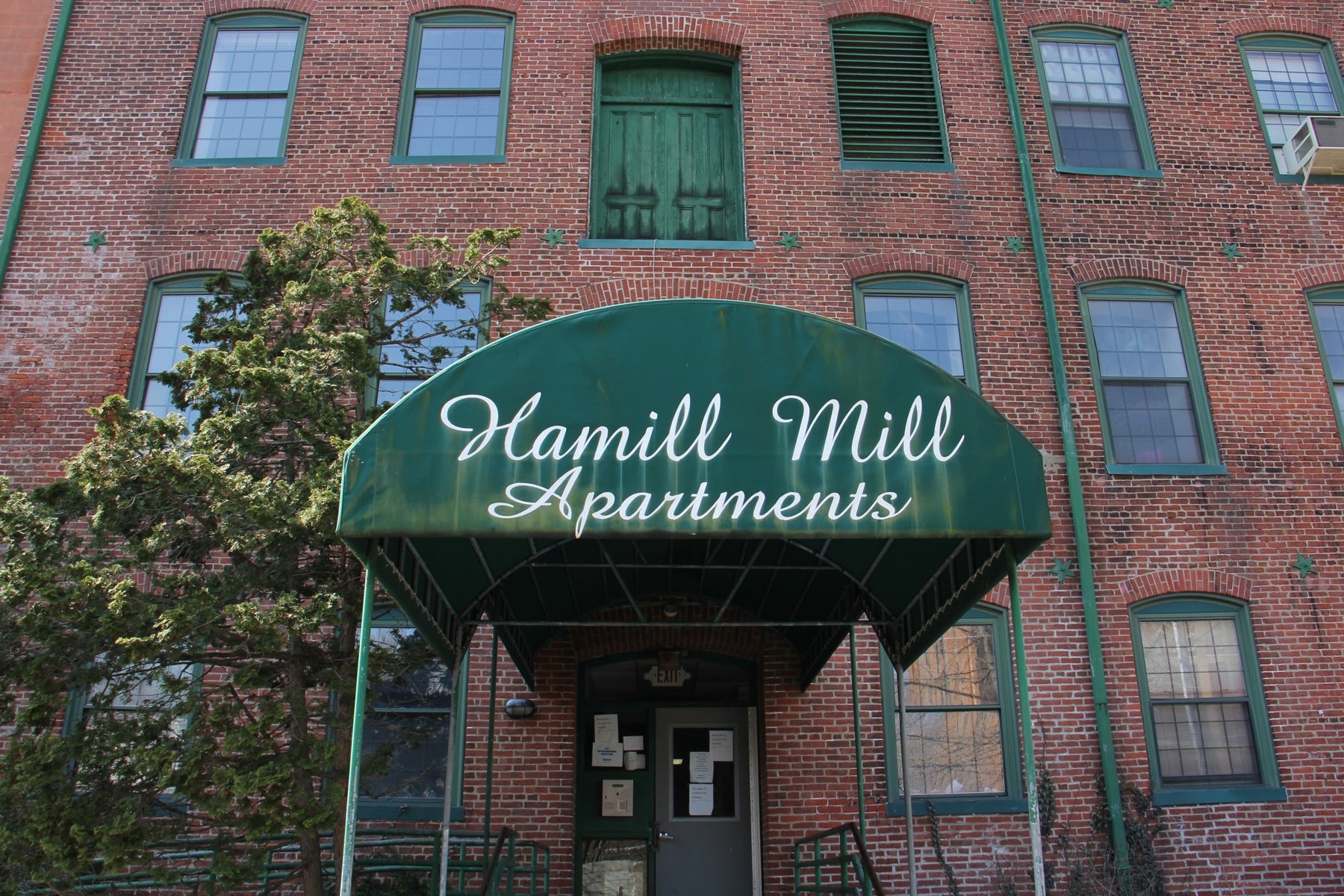
But first, a community planning process done in concert with local groups and the city’s Planning Department will unfold, Heller said. The redevelopment will cost millions and require significant public subsidy, officials say.
“Now the real work begins,” Heller said.
Other properties may be offered up to private developers through a public process, which would eventually add City Councilmember Cindy Bass to the conversation, thanks to the practice of councilmanic prerogative. The tradition gives district councilmembers considerable influence over real estate decisions involving city-owned land.
“We want to make sure that there is a formal process [for doling out the properties] that everyone is aware of,” said Bass, who was not aware of the city takeover until a reporter reached her on Tuesday.
Freeman’s history in the city runs deep. He controlled hundreds of affordable housing units while directing Settlement, which wielded tremendous power — and millions of taxpayer dollars — with considerable help from political allies, most notably the area’s previous City Councilmember, Donna Reed Miller.
At first, Settlement was considered a responsible organization with viable programs, which provided social services, foster care and counseling, among other things.
But around 2000, things started unraveling at Settlement and a related housing company responsible for managing its vast portfolio of affordable housing units.
“It just became a domino effect, where you would take money from a successful program to prop up a failing program. But then the formerly successful program was short of money and now, that’s starting to fail and the whole thing fell apart,” said longtime Germantown resident Irv Acklesberg.
By 2010, Settlement was filing for bankruptcy because Freeman mismanaged all those taxpayer dollars while the nonprofit carried millions in debt. Ackelsberg, an attorney, was a party in the case.
“[The neighborhood] lost its one social service provider, it lost its housing development corporation, it lost all of these assets,” he said.
Yet even as Settlement dissolved, Freeman retained control of many of the properties once part of the nonprofit’s empire. Until now.
 WHYY is one of over 20 news organizations producing Broke in Philly, a collaborative reporting project on solutions to poverty and the city’s push towards economic justice. Follow us at @BrokeInPhilly.
WHYY is one of over 20 news organizations producing Broke in Philly, a collaborative reporting project on solutions to poverty and the city’s push towards economic justice. Follow us at @BrokeInPhilly.
WHYY is your source for fact-based, in-depth journalism and information. As a nonprofit organization, we rely on financial support from readers like you. Please give today.





